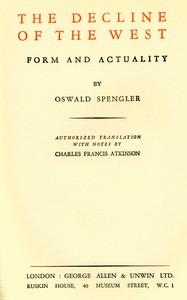The decline of the West : Volume 1, Form and actuality by Oswald Spengler
"The Decline of the West: Volume 1, Form and Actuality" by Oswald Spengler is a philosophical treatise on history, likely written in the early 20th century. The work introduces a novel approach to understanding historical developments, positioning itself against traditional narratives of a linear progression of civilizations, particularly that of Western culture. Spengler's central thesis revolves around the idea that cultures, much like living organisms, go through cyclical phases of birth, maturity,
decline, and death. The opening of the book sets the scene for an ambitious inquiry into the nature of culture and history. Spengler poses significant philosophical questions regarding the existence of underlying structures in world history, seeking to establish a "morphology of world-history." He contrasts this with existing historical narratives, arguing for a viewpoint that sees cultures as organic entities, each with its own life cycle. This introduction establishes the groundwork for exploring how the Western Culture stands at a critical juncture, drawing parallels to past cultures while contending with its own inevitable decline. Through his exploration, Spengler invites readers to reconsider their perspectives on history and the lessons that can be drawn from studying different cultures and their trajectories. (This is an automatically generated summary.)
Read now or download (free!)
| Choose how to read this book | Url | Size | ||||
|---|---|---|---|---|---|---|
| Read online (web) | https://www.gutenberg.org/ebooks/72344.html.images | 2.0 MB | ||||
| EPUB3 (E-readers incl. Send-to-Kindle) | https://www.gutenberg.org/ebooks/72344.epub3.images | 874 kB | ||||
| EPUB (older E-readers) | https://www.gutenberg.org/ebooks/72344.epub.images | 900 kB | ||||
| EPUB (no images, older E-readers) | https://www.gutenberg.org/ebooks/72344.epub.noimages | 767 kB | ||||
| Kindle | https://www.gutenberg.org/ebooks/72344.kf8.images | 1.5 MB | ||||
| older Kindles | https://www.gutenberg.org/ebooks/72344.kindle.images | 1.3 MB | ||||
| Plain Text UTF-8 | https://www.gutenberg.org/ebooks/72344.txt.utf-8 | 1.5 MB | ||||
| Download HTML (zip) | https://www.gutenberg.org/cache/epub/72344/pg72344-h.zip | 1.2 MB | ||||
| There may be more files related to this item. | ||||||
About this eBook
| Author | Spengler, Oswald, 1880-1936 |
|---|---|
| Translator | Atkinson, Charles Francis, 1880-1960 |
| Title | The decline of the West : Volume 1, Form and actuality |
| Original Publication | London: George Allen & Unwin, 1926. |
| Note | Wikipedia page about this book: https://en.wikipedia.org/wiki/The_Decline_of_the_West |
| Note | Reading ease score: 45.8 (College-level). Difficult to read. |
| Credits | Tim Lindell, KD Weeks and the Online Distributed Proofreading Team at https://www.pgdp.net |
| Language | English |
| LoC Class | CB: History: History of civilization |
| Subject | Civilization -- History |
| Category | Text |
| EBook-No. | 72344 |
| Release Date | Dec 6, 2023 |
| Copyright Status | Public domain in the USA. |
| Downloads | 1166 downloads in the last 30 days. |
| Project Gutenberg eBooks are always free! | |

